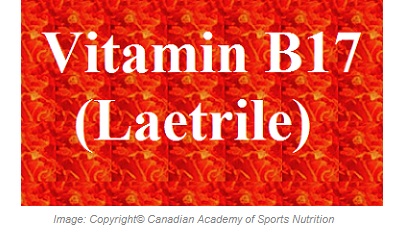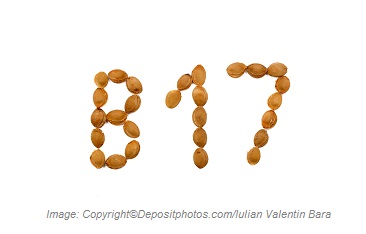 as laetrile and amygdalin. In terms of chemical structures, laetrile and amygdalin are somewhat different. In fact, laetrile is a modified form of amygdalin. However, both laetrile and amygdalin are considered as vitamin B17, and they are chemically nitrilosides.
as laetrile and amygdalin. In terms of chemical structures, laetrile and amygdalin are somewhat different. In fact, laetrile is a modified form of amygdalin. However, both laetrile and amygdalin are considered as vitamin B17, and they are chemically nitrilosides.
Functions of Vitamin B17:
Vitamin B17 has an anti – cancer activity. The metabolism of laetrile produces cyanide. It is claimed that cyanide is inactivated in normal cells by the enzyme rhodanese. But cancer cells do not have this enzyme, which leads to buildup of cyanide within the cancer cells followed by poisoning them to death. There are many controversial clinical trials to support the claim.
Food Sources and Absorption:
Apricot kernels and apple seeds are excellent sources of vitamin B17. Other food sources include bitter almonds, nectarine seeds, peach seeds, pear seeds, plum seeds, prune seeds, fava beans (sprouted), mung beans (sprouted), blackberry, choke berry, elderberry, and alfalfa leaves.
Small amounts of vitamin B17 are also found in flaxseeds, chia seeds, sesame seeds, millets, buckwheat, and lentils (sprouted). It is absorbed from the small intestine into the blood stream.
Benefits of Vitamin B17:
Vitamin B17 might be beneficial in the following conditions:
- Cancers.
- High blood pressure.
- Arthritis.
Dosage:
One apricot kernel provides about 14 mg of vitamin B17. It is claimed that any of the following options may provide enough vitamin B17 to prevent developing cancers:
- 10 – 20 apricot kernels per day.
- 1 – 2 cups of fresh mung bean sprouts.
- One apricot kernel per 10 Ibs of body weight per day. For instance, if your weight is 150 Ibs, you could take 15 apricot kernels per day.
- 3 – 4 whole apples (with seeds) per day.
No RDA has been established for this vitamin. It is available as tablets, capsules, and powders. Vitamin B17 is usually taken 250 – 1000 mg per day. It is toxic in larger amounts.

